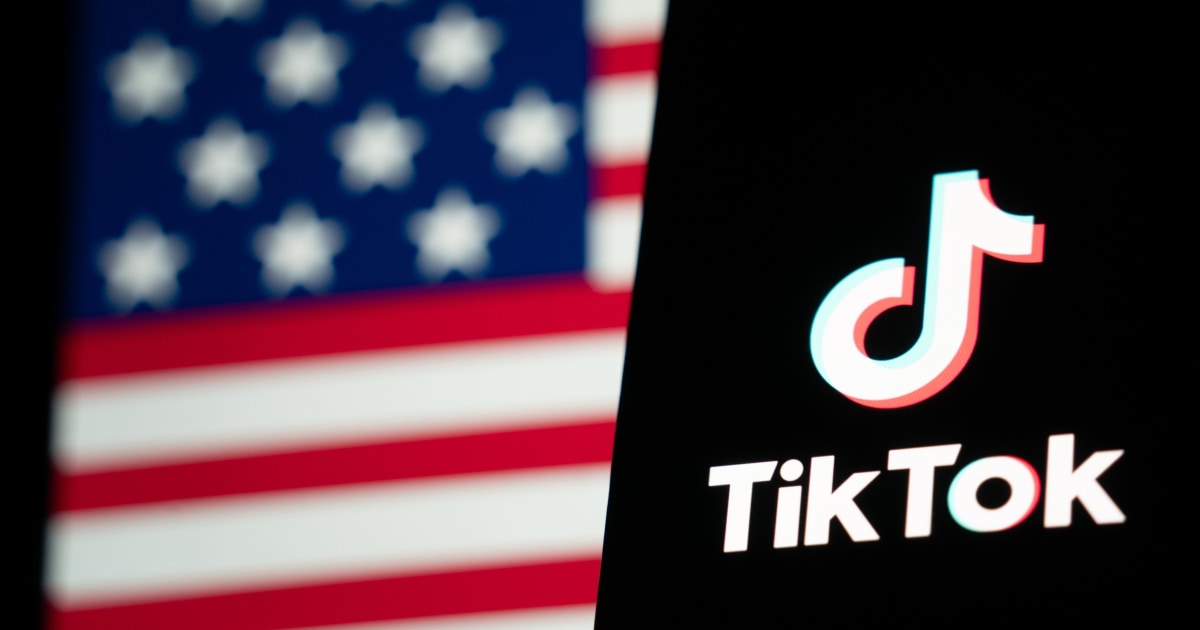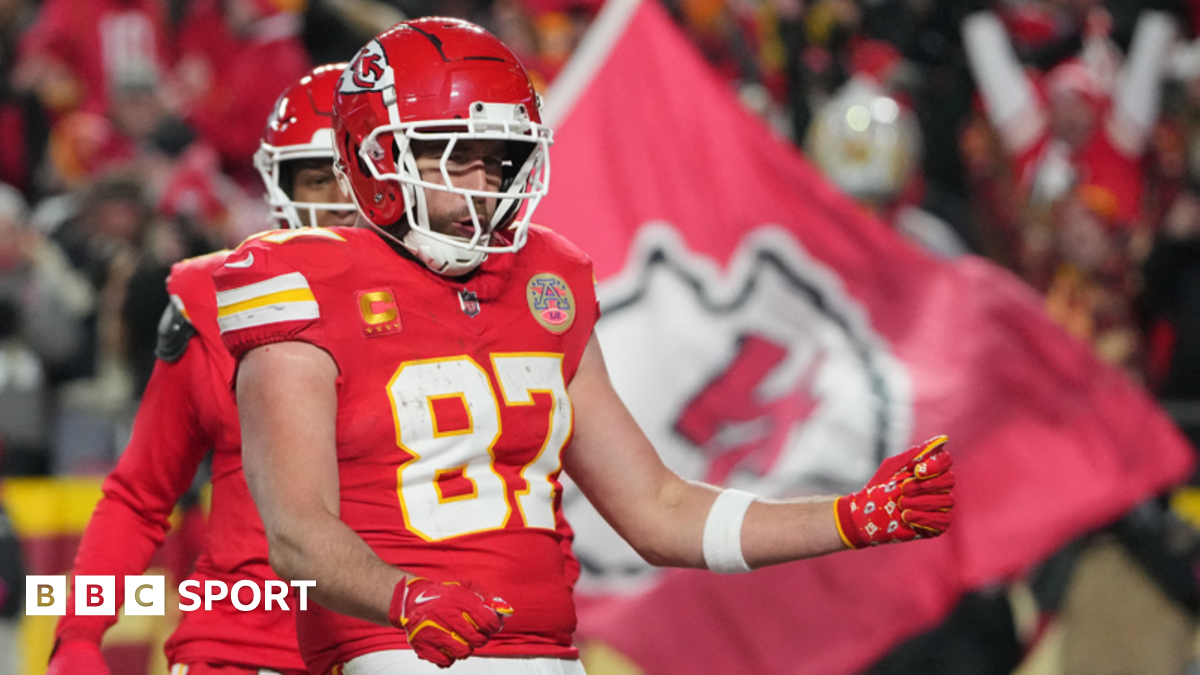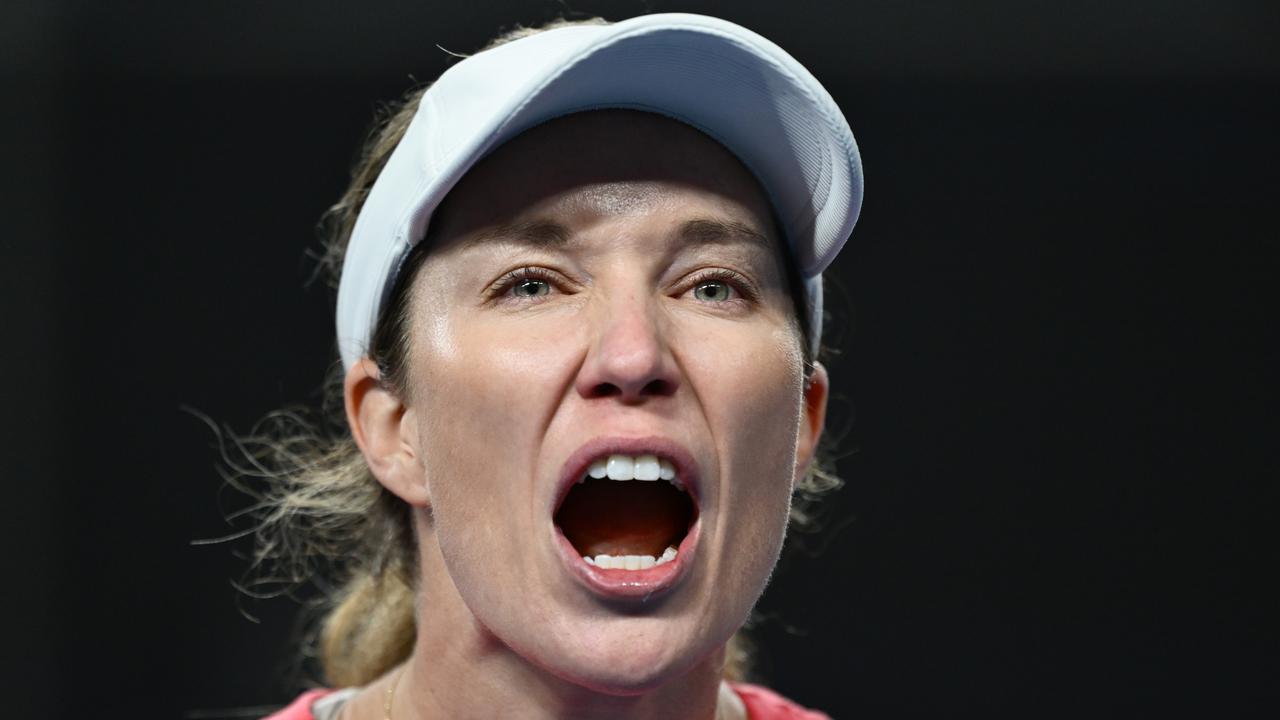Jimmy Carter: The US president who became China’s friend
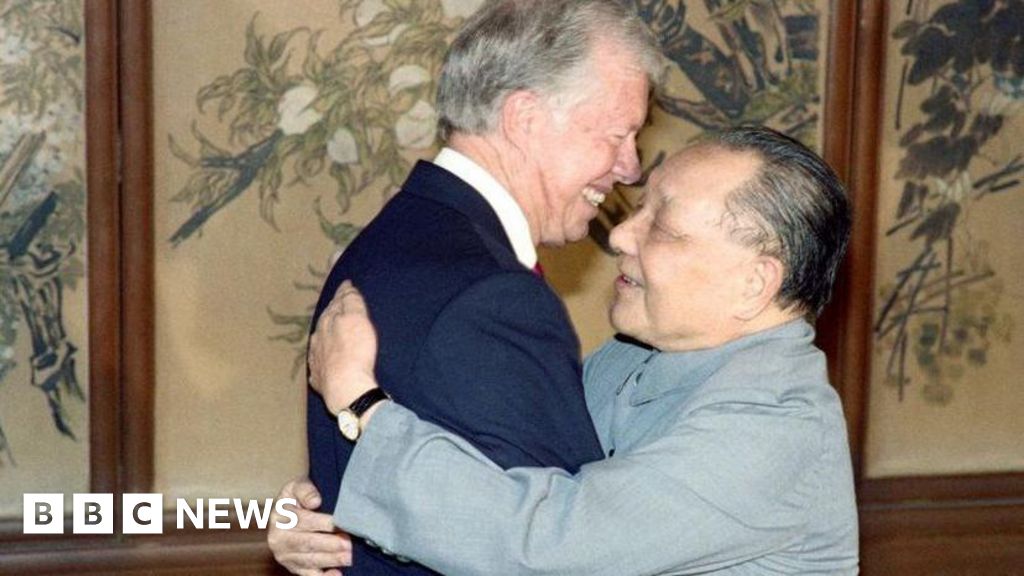
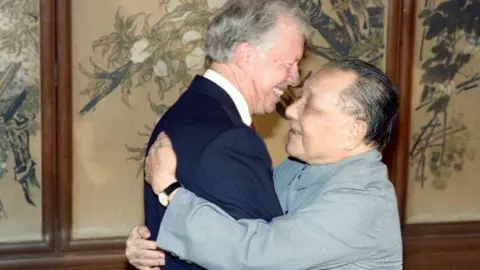 Getty Images
Getty ImagesOn a bright January morning in 1979, then US president Jimmy Carter greeted a historic guest in Washington: Deng Xiaoping, the man who unlocked China’s economy.
The first leader of Communist China to visit the United States, Deng had arrived the previous evening, to light snow and a welcome by the US vice-president, the secretary of state and their spouses.
It was the start of a diplomatic relationship that would forever change the world, setting the stage for China’s economic ascent – and later, its rivalry with the US.
Establishing formal ties with China was among Carter’s more remarkable legacies, during a turbulent presidency that ended with one term.
Born on 1 October, the same date as the founding of the People’s Republic of China, “he liked to say it was destiny that brought him and China together”, said Yawei Liu, a close friend of Carter’s.
Even after leaving office, he painstakingly cultivated a close bond with the Chinese people – but that was affected as ties between Washington and Beijing cooled.
Yet he remains one of a small group of US statesmen cherished by Beijing for helping to bring Communist China out of isolation in the 1970s.
Beijing has expressed its condolences, calling Carter the “driving force” behind the 1979 agreement. But the Chinese internet has gone much further, referring to him as “Meirenzong” or the “benevolent American”, giving him a title that was once reserved for emperors.
Wooing Beijing
Carter’s first encounter with China was in 1949, while the country was suffering the final convulsions of a bloody decades-long civil war.
As a young US naval officer, his submarine unit was dispatched to Qingdao in eastern China. They were to aid Kuomintang troops who were fending off a Communist siege by Mao Zedong’s army.
Just kilometres away behind enemy lines was a Chinese commander named Deng Xiaoping.
When they finally met decades later, it was as leaders of their respective countries.
It was an earlier US President, Richard Nixon, and his secretary of state Henry Kissinger who had laid the groundwork for wooing what was then Mao’s China. With Beijing and Moscow at loggerheads, they had sensed an opportunity to draw away a Soviet ally.
But those efforts culminated under Carter – and Deng – who pushed for deeper ties. For months, the US president dispatched trusted negotiators for secret talks with Beijing.
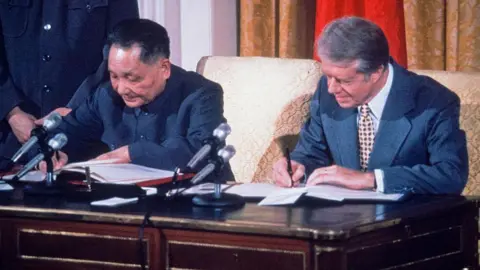 Getty Images
Getty ImagesThe breakthrough came in late 1978. In the middle of December, the two countries announced that they would “recognise each other and establish diplomatic relations from January 1, 1979”.
The world was surprised and Beijing was elated, but the island of Taiwan, which had long relied on US support against Chinese claims, was crushed. Carter is still a controversial figure there.
Previously, the US had only recognised the government of Taiwan, which China viewed as a renegade province. And for years US support for Taiwan had been the sticking point in negotiations.
Switching recognition to Beijing meant the US had finally acknowledged China’s position that there was only one Chinese government – and it was in Beijing. This is the One China policy, which, to this day, forms the cornerstone of US-China relations.
But the pivot raised inevitable questions about US commitment to its allies. Uneasy with Carter’s decision, Congress eventually forced through a law codifying its right to provide Taiwan with defensive weapons, thus creating a lasting contradiction in US foreign policy.
Still historians agree that 1979 signalled an extraordinary set of moves that reoriented global power: not only did it unite the US and China against the Soviet Union, but also paved the way for peace and rapid economic growth in East Asia.
A ‘unique’ friendship
But Carter could not have done it without his special relationship with Deng Xiaoping. “It’s a pleasure to negotiate with him,” Carter wrote in his diary after spending a day with Deng during his January visit, according to Deng’s biographer Ezra Vogel.
“The two of them followed common sense, there were actually significant similarities in their no-nonsense personalities,” said Dali Yang, a professor of political science at the University of Chicago. “There was something really unique between the two men that really established trust.”
Deng Xiaoping had survived three political purges under Mao to emerge as one of China’s most consequential leaders. Historians credit his vision, self-assurance, frankness and sharp wit in no small part for this crucial diplomatic win.
He sensed the opportunity Carter offered, Vogel writes – to both thwart Soviet power and to kickstart the modernisation that had begun in Japan, Taiwan and even South Korea. He knew it would elude China without US help.
Deng’s visit to the US began with a warm first meeting at the White House, where he chuckled while revealing his Qingdao connection to Carter, according to Chinese reports. He was exuberant as the two clasped hands in front of cameras in the Rose Garden, saying: “Now our two countries’ peoples are shaking hands.”
Over the next few days, Deng staged a whirlwind charm offensive on the Americans as he toured several states with Carter. In one famous image, Deng is seen grinning as he dons a cowboy hat at a Texan rodeo. “Deng avoids politics, goes Texan,” read a local newspaper headline.
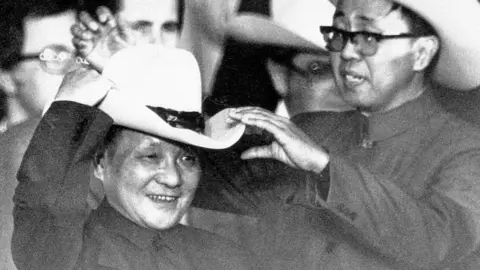 Getty Images
Getty ImagesCarter described Deng as “smart, tough, intelligent, frank, courageous, personable, self-assured, friendly”, according to Vogel.
He later wrote in his diary the trip was “one of the delightful experiences of my Presidency… to me, everything went right, and the Chinese leader seemed equally pleased.”
“Carter was really a catalytic agent for what was more than a diplomatic rapprochement – it was a dramatic moment of signalling,” said Orville Schell, the director of the Asia Society’s Centre on US-China Relations who, as a journalist in 1979, covered Deng’s trip.
“He introduced Deng to the country and actually to the world. It made what had been a contentious relationship to something very congenial. The way Carter and Deng interacted, these were signals that it was okay to both peoples to set history aside and start a new relationship.”
Under Carter, China was granted “most favoured nation” trade status, boosting its economy and creating jobs. Within a year, two-way trade between the two countries doubled.
Throughout the next decade China became an important trade partner not just for the US but also the world, which was “extraordinarily important” for China’s growth, noted Prof Yang.
A lifelong connection
Carter’s connection with China endured long after his presidency ended.
In the 1990s his non-profit group The Carter Center played a significant role in China’s nascent grassroots democracy where – on the invitation of the Chinese government – it observed village elections, trained officials and educated voters.
Unusually for a former US president, Carter returned several times to China on personal visits. On one trip, he and his wife Rosalynn helped to build shelters for victims of the 2008 Sichuan earthquake.
His commitment to humanitarian work, his humble background as the son of a peanut farmer, and “folksy style” – which stood in contrast to the formal public personas of Chinese leaders – endeared him to many Chinese, according to Prof Yang: “He will be seen as a role model of a leader who cares, not just in rhetoric but also in actions.”
“Everywhere he travelled in China, people showed their warm feelings for him… The Chinese people really liked him for his courage and his honesty,” said Dr Liu, a senior adviser with the Carter Center. He accompanied Carter on several trips, including a 2014 tour where he was fêted by local officials and universities.
In Qingdao, the city put on a surprise fireworks show for his 90th birthday. In Beijing, Deng’s daughter hosted a banquet and presented a gift – a copy of the People’s Daily front page of the 1979 communique. “Both were moved to tears,” Dr Liu recalled.
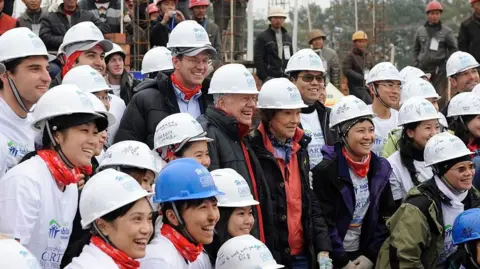 Getty Images
Getty ImagesThat was to be his last visit. As the US-China relationship grew rockier, so too did Carter’s ties with the Chinese leadership, particularly after Xi Jinping took power.
On the eve of his 2014 visit, top government officials instructed universities not to sponsor his events, prompting a last-minute scramble to change venues, Carter noted.
A state dinner held for him at the Great Hall of the People in Beijing was sparsely attended, recalled Mr Schell. Notably, it was hosted by then vice-president Li Yuanchao, while Xi was said to be entertaining another dignitary elsewhere in the complex.
“He wouldn’t even come to tip his hat to Carter. That really showed the state of relations,” Mr Schell said. “Carter was really very angry. Two of his aides told me he even felt like leaving early because he felt disrespected.”
The Carter Center’s activities in China were eventually curtailed, and a website they maintained to document the village elections was taken offline. No clear explanation was given at the time, but Dr Liu attributed this to China’s growing suspicion of foreign organisations following the 2010 Arab Spring.
Though Carter said little about the snub publicly, it would have been felt no less acutely, given the lengths he had gone to advocate for engagement.
It has also raised questions whether his approach on human rights with China – he characterised it as “patience” but others criticised it as soft-pedalling – was justified in the end.
Carter often “made a tremendous effort… not to stick fingers into China’s eyes on the human rights question,” Mr Schell noted. “He did temper himself even when he was out of office, as The Carter Center had a real stake in the country.”
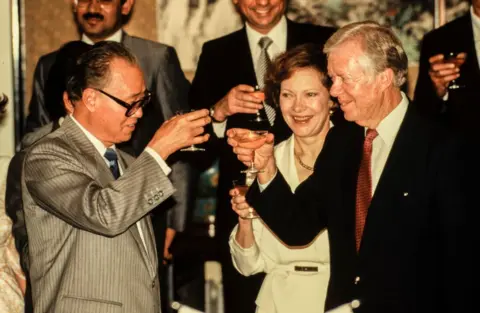 Getty Images
Getty ImagesSome see his decision to engage with Communist China as born out of an American sincerity at the time. Following the violent chaos of the Cultural Revolution, there was “a disbelief among many Americans – how could the Chinese be living in angry isolation?” Prof Yang said. “There was a genuine desire among American leaders to really help.”
Others say that in attempting to shore up support against the Soviets, the US set the course for China’s rise and ended up creating one of its greatest rivals.
But these actions also benefited millions of Chinese, helping to lift them out of poverty and – for a time – widening political freedom at the local level.
“I think all of us from that generation were children of engagement,” Mr Schell said. “We were hoping Carter would find the formula that would slowly bring China into a comfortable relationship with [the] US and the rest of the world.”
Toward the end of his life, Carter grew more alarmed about the growing distrust between the US and China, and frequently warned of a possible “modern Cold War”.
“In 1979, Deng Xiaoping and I knew we were advancing the cause of peace. While today’s leaders face a different world, the cause of peace remains just as important,” he wrote on the 40th anniversary of normalisation of relations.
“[Leaders] must accept our conviction that the United States and China need to build their futures together, for themselves and for humanity at large.”
Related
Trump’s Inauguration: Latin American Leaders, Austerity and Populism in Focus…
As the world and the United States prepare for another Trump presidency beginning January 20, 2025, a carefully curated list of invited guests has been unveiled
Who is Lex Fridman, popular American podcaster set to interview…
Renowned American podcaster and computer scientist Lex Fridman announced on Sunday (January 19) that he will interview Prime Minister Narendra Modi at the end o
‘American Primeval’ Team on Portraying the Brutal History of America’s…
[This story contains spoilers from Netflix’s American Primeval.] “We do believe that people, if they want to understand where we’re at toda
Donald Trump inauguration: Indian-Americans take center stage in Trump 2.0…
As President Donald J. Trump begins his second term, the spotlight is on the inclusion of Indian-Americans in key positions within his administration. The shift






